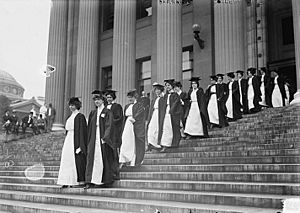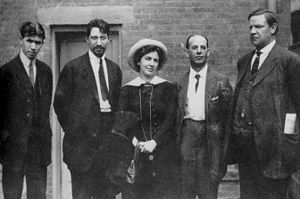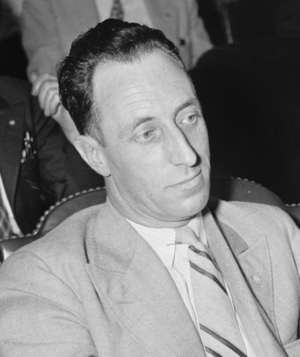Carol Weiss King facts for kids
Quick facts for kids
Carol Weiss King
|
|
|---|---|
| Born |
Carole Therese Weiss
August 24, 1895 New York City, US
|
| Died | January 22, 1952 (aged 56) New York City, US
|
| Nationality | American |
| Other names | Carol King |
| Education | Barnard College |
| Alma mater | New York University Law School |
| Occupation | Attorney, legal organizer |
| Years active | 1917–1952 |
| Known for | Pro-communist, civil rights legal defenses of Harry Bridges, Gerhart Eisler, J. Peters |
|
Notable work
|
American Committee for the Protection of Foreign Born, International Labor Defense, International Juridical Association, National Lawyers Guild |
| Spouse(s) | Gordon Congdon King |
| Children | son |
| Parent(s) | Samuel Weiss, Carrie Stix |
| Family | William Stix Weiss; Nina Henrietta Weiss Stern, Louis Stix Weiss |
Carol Weiss King (born August 24, 1895 – died January 22, 1952) was a very important American lawyer. She was known for defending immigrants and people accused of being communists. She also helped start two major legal groups: the International Juridical Association and the National Lawyers Guild. Her career happened during tough times in American history, from the Palmer Raids to the McCarthy Era. During these times, many people faced unfair accusations.
Contents
Early Life and Education

Carol Weiss was born in New York City on August 24, 1895. Her parents were Samuel William Weiss and Carrie Stix. Her father was also a lawyer.
In 1912, Carol started college at Barnard College. She was a very active student. She acted in school plays and played basketball. She also joined the student newspaper, the Barnard Bulletin, as an editor. Carol graduated from Barnard College in 1916.
After college, she went to law school. In 1920, she earned her law degree from New York University.
Starting Her Legal Career
Carol began her career by helping others. In 1916, she volunteered for a group that worked on labor laws. In 1917, she helped the American Civil Liberties Union (ACLU). The ACLU works to protect people's rights.
By 1920, she was known as Carol Weiss King. She volunteered for a clothing workers' union. In 1921, she opened her own law office. She quickly became known for helping people who were facing legal trouble.
Carol often worked with other lawyers who believed in protecting civil rights. She also worked with people who were part of the Communist Party.
Fighting for Rights
Carol Weiss King spent 30 years defending immigrants. Many of her clients were foreign-born people who were accused of being radicals. They faced being sent out of the country (deported). She argued cases in lower courts and even in the highest court, the Supreme Court of the United States.
In 1942, she became the main lawyer for the American Committee for the Protection of Foreign Born (ACPFB). This group helped immigrants. Because she defended so many controversial clients, the FBI watched her closely.
Important Legal Groups
Carol Weiss King helped create several important legal organizations:
- In 1925, she helped start the International Labor Defense. This group provided legal help to workers.
- In 1931, she was the main founder of the International Juridical Association. This group studied legal issues related to civil liberties.
- In 1937, she helped create the National Lawyers Guild. This group supported lawyers who worked for social justice.
- From 1942 until her death in 1952, she was the general counsel for the American Committee for the Protection of Foreign Born.
Famous Cases
Carol Weiss King worked on many important cases. She helped defend people in several cases that went to the U.S. Supreme Court. These included the first Scottsboro Boys case in 1932.
Harry Bridges Case (1938)
One of her most famous clients was Harry Bridges. He was a union leader. In 1938, the government tried to deport him. They said he was a member of the Communist Party. Carol King fought for him all the way to the Supreme Court. The Court eventually stopped his deportation.
William Schneiderman Case (1940)
Carol King also defended William Schneiderman. He was a leader in the Communist Party. The government tried to take away his U.S. citizenship. Carol King convinced Wendell Willkie, a famous lawyer and former presidential candidate, to help with the case. In 1943, they won, and Schneiderman kept his citizenship.
Gerhart Eisler Case (1947)
In 1947, Carol King represented Gerhart Eisler. He was accused of being a communist agent. She argued that he was being unfairly targeted. Even though the jury found him guilty, Carol King's defense highlighted issues with the case.
J. Peters Case (1948)
Carol King also defended J. Peters. He was accused of being part of a Soviet spy ring. She advised him on how to speak before the House Un-American Activities Committee (HUAC). This committee investigated people suspected of disloyalty.
Sung v. McGrath (1950)
One of her biggest legal wins was the case of Sung v. McGrath in 1950. In this case, the Supreme Court agreed with Carol King. They ruled that the Immigration and Naturalization Service (INS) had to follow the same fair rules as other government departments. This decision helped protect the rights of many immigrants facing deportation.
Later Cases

In 1951, Carol King joined other lawyers to defend 17 members of the Communist Party. They were accused of planning to overthrow the government. One of her clients was Elizabeth Gurley Flynn, a well-known activist.
Carol King also represented Angelo Herndon, an African-American communist organizer. She continued to take on important immigration cases until her death.
Personal Life and Death
Carol Weiss married Gordon Congdon King in 1917. Her husband passed away in 1930. She continued her important legal work while raising their son.
Carol Weiss King died of cancer on January 22, 1952, at the age of 56.
Her Lasting Impact
Carol Weiss King is remembered for her dedication to justice. Barnard College recognized her work in 1951, calling her a "prominent lawyer specializing in immigration work."
Today, the National Lawyers Guild honors her legacy. They give out the Carol King award each year to a lawyer who has done outstanding work in immigration law. Her work helped shape how immigration cases are handled in the United States and protected the rights of many people.
Works
- "The Sacco-Vanzetti Case is not Dead," New Masses (1933)


